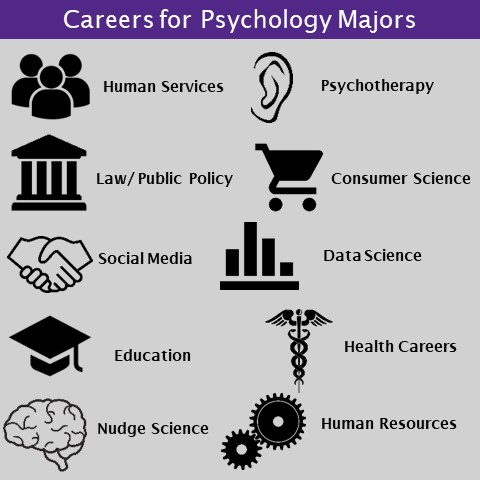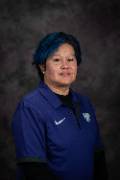Undergraduate Program Overview
The Psychology major offers a broad-based foundation for the study of psychology while providing our students flexibility and choice in their undergraduate experience. Students have an opportunity to learn about the complex and multifaceted aspects of thoughts and behaviors while being presented with many opportunities to participate in our department’s wealth of ongoing research. The major can be completed in little more than 30 credit hours allowing our students to explore double majors, minors, and even dual degrees. A degree in Psychology is often chosen by students who are interested in pursuing careers in research, therapy, human services, or a variety of careers that only require a bachelor’s degree.
Psychology Major & Career Possibilities
The Psychology major allows our students to examine the fundamentals of the field of psychology. Our students complete their undergraduate education with either a Bachelor of Arts or a Bachelor of Science degree. Here are just a few possible careers:
- Human Services Manager
- Mental Health Technician
- Police and Law Enforcement Officer
- Corrections Officer
- Life Skills Specialist
- Victim Advocate
- Human Resources Manager
- Case Manager
- Account Executive
Additionally, many of our students continue their education into graduate school focusing on a wide variety of disciplines both inside the field of psychology and out. Some of those include:
- Cognitive Psychology
- Behavioral Neuroscience
- Industrial/ Organization Psychology
- Social Psychology
- Clinical Psychology
- Counseling Psychology
- Medical School
- Occupational Therapy
- Law School
- Physical Therapy
Psychology Satisfaction
Not all jobs are created equally. Some jobs have a higher pay relative to others, however salary may not reflect other factors like overall job satisfaction. The graph below illustrates how Psychology measures against other fields in both salary and satisfaction.
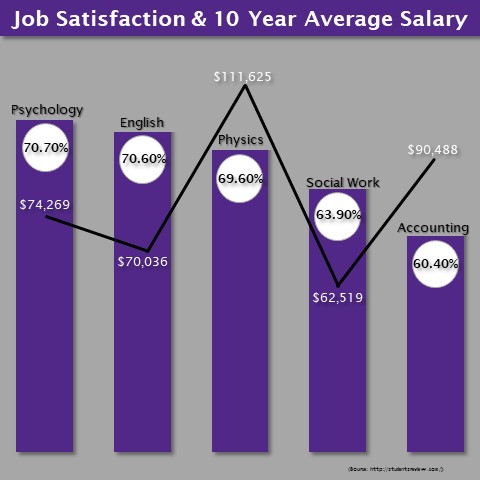
You can also visit our undergraduate Careers Page for more information.
Also, check out these informative websites:
American Psychological Association's information on jobs for Bachelor's degree in Psychology.
O*Net Online Resource for occupations in Psychology.
Career Profiles for jobs for those with bachelor's degrees in Psychology.
Core Course Selection
Psychology is a dynamic discipline with a variety of unique areas of specialization that stem from a firm foundation. The undergraduate degree program provides our students with the core education each psychology student needs to be successful while allowing them to explore areas of specialization.
| PSYCH 110-General Psychology |
| PSYCH 500-Junior Seminar in Psychology (Fall) |
| STAT 325-Intro to Statistics |
| PSYCH 350-Experimental Methods in Psychology |
| PSYCH 351-Experimental Methods Laboratory |
Students choose two (2) of the following courses after completing PSYCH 350:
| PSYCH 460-Cognitive Psychology |
| PSYCH 470-Psychobiology (PR: BIOL 198) |
| PSYCH 475-Principles of Learning |
| PSYCH 480-Fundamentals of Perception and Sensation |
Students also choose one (1) of the following courses after completing PSYCH 350:
| PSYCH 605-Advanced Social Psychology |
| PSYCH 620-Psychology of Personality |
Students must also choose one (1) of the following courses from Applied or Health Psychology:
| PSYCH 505-Abnormal Psychology |
| PSYCH 518-Introduction to Health Psychology |
| PSYCH 560-Industrial Psychology |
| PSYCH 564-Psychology of Organizations |
| PSYCH 565-Occupational Health Psychology |
Students also complete twelve (12) hours of Psychology electives of their choice. Those hours can also be used to select an area of specialization.
Areas of Specialization
The courses presented in these specializations represent possible course combinations for students who may be interested in a specific area of psychology. The titles featured below do not represent degree designations.
Behavioral Neuroscience
Behavioral Neuroscience studies the organic brain and how it changes relative to behavior, stimuli, abnormalities, and changes over time.
| PSYCH 202-Drugs and Behavior |
| PSYCH 370-Brain and Behavior |
| PSYCH 470-Psychobiology |
| PSYCH 570-Psychopharmacology |
| PSYCH 599-Problems in Psychology |
| PSYCH 630-Human Neuropsychology |
Cognitive
Cognitive Psychology studies mental processes like thinking, memory, learning, and perception.
Industrial/ Organizational
Industrial-Organizational Psychology studies human behavior in the workplace and organizations and how to solve problems in each.
Social/Personality
Social Psychology studies as aspects of behavior of an individual in a social context
Clinical
Clinical Psychology studies mental illness and disability relative to diagnosis and treatment of a variety of conditions.
Psychology Minor
Students now have the opportunity to pursue a Minor in Psychology.
A Psychology minor offers students a variety of unique areas of study to enhance their existing major. Our minor consists of 18 hours and includes:
| PSYCH 110-General Psychology |
| PSYCH Elective |
| PSYCH Elective |
| PSYCH Elective |
| PSYCH Elective |
| PSYCH 350-Experimental Methods in Psychology |
Please note: PSYCH 351, 460, 475, 480, and 605 are for Majors Only. Minor students will not be eligible to take these classes. Additionally, no more than 3 credit hours of PSYCH 599 Research may be used toward the minor.
Add or Drop the Psychology Minor
Fill out this form to declare (add or drop) your Psychology Minor.
Questions?
Contact Sarah Buchanan at buchs@k-state.edu for more information
Undergraduate Research Opportunities
The Psychological Sciences department at Kansas State University is dedicated to a variety of research areas. Our undergraduates have a unique opportunity to work alongside our faculty and graduate students while employing the skills they have learned in the classroom.
Psychological Sciences Research can be taken for credit toward graduation as PSYCH 599. Students can achieve 0-6 credit hours per semester for their work in one of our many research labs. If you are a Biology student working in a neuroscience lab, PSYCH 599 credits can be accepted as equivalent to BIOL 698.
If you are interested in joining a research lab, check out the different labs below to find out more about what each lab is doing. Choose a lab that aligns with your interests and career goals and reach out to the lab contact to let them know your interest in joining their lab.
Undergraduate Research Laboratories
Dr. Heather Bailey Lab
Memory & Aging
Dr. Bailey’s research focuses on how memory differs across individuals and how it changes with age. Some of her students are evaluating how strategies influence students’ learning, memory and problem solving. Other students are studying how young and older adults use information they have learned in the past to help them learn and remember new information. Finally, others are evaluating how individuals with PTSD learn and remember everyday activities. We use different methods to evaluate these questions, including computer tasks, eye tracking, and neuroimaging. Undergraduate research assistants help to collect and analyze data, develop experiments, participate in weekly lab meetings and engage in professional development opportunities.
GPA Requirement: 3.0 but students who can provide a strong reference letter will also be considered
Special Requirement: Must be available 6 hours a week
Class Requirement: PSYCH 350 or equivalent course from another department
Contact: Dr. Bailey
Dr. Christopher Barlett Lab
Aggression Research Laboratory
In the ARL, we study the antecedents and consequences of aggressive behavior (broadly defined). Topics include: cyberbullying, provocations, personality (e.g., fear of retaliation), and aggression reduction through the situation (e.g., excuses and apologies) or intervention. Research assistants can expect to learn theory and methodology related to social psyhology. Undergraduate research assistants may also learn data analysis, project dissemination, and critical thinking skills.
GPA Requirement: NA
Class Requirement: NA
Career Interest: Medical or Graduate School
Contact: Dr. Barlett
Dr. Natalie Barlett Lab
Dr. Natalie Barlett Laboratory
The Barlett Development Lab explores how movement through emerging adulthood (from 18 - 25 years of age) can impact one’s personality (e.g., narcissism), psychological well-being (e.g., worry) and physical health (e.g., sleep). The lab is also working to identify factors that can support emerging adults during their transitional journey based on their identity and background. Research assistants can expect to learn about developmental research and theory, how a research study is created and executed, data analysis, and dissemination of research findings.
GPA Requirement: 3.0
Class Requirement: Completion of PSYCH 350 is preferred, but not required
Special Requirement: Strong interest in human development and the research process
Contact: Dr. Natalie Barlett
Dr. Laura Brannon Lab
Attitude & Persuasion
In the BAPL, we study how people form attitudes, how they can be changed, and how that affects their behavior. Students in our lab will learn to read, analyze, and discuss research articles. They will also learn to collect, clean and analyze data as well as conduct guided research projects.
GPA Requirement: 2.5 or better
Class Requirement: PSYCH 350 preferred but not required, sophomore standing or higher, and interest in presenting at conferences
Special Requirement: At least 2 credits of PSYCH 599 (6+ hours per week in lab) and an interest in attitudes, persuasion, and Health Psychology.
Contact: Dr. Brannon
Laboratory Informational Flyer
For application processess, please see our labratory informational flyer.
Dr. Gary Brase Lab
Adaptive Reasoning & Decisions
We do studies on how people make judgments and decisions across different real-life situations. This includes how people use numbers to understand things like medical test results, how people reason about social rules about behavior, and how people make decisions about relationships (judgments of attractiveness, choosing partners, and having children). We apply cognitive, social, and evolutionary theories across all this work.
GPA Requirement: 3.0
Career Interest: Research
Class Requirement: Good performance in PSYCH 350
Contact: Dr. Brase
Dr. Mary Cain Lab
Addiction Neuroscience
In the Cain lab we use animal models of early life environmental differences, to unravel the underlying mechanisms of addiction and addiction vulnerability. Undergraduates in the lab can expect to learn aspects of several scientific disciplines including both behavioral and neurobiological techniques. Many also learn surgical techniques, improve their data interpretation skills, scientific literacy, and critical thinking.
GPA Requirement: N/A
Class Requirement: N/A
Special Requirement: The amount of time in the lab is based on the number of credit hours enrolled (PSYCH 599) or the requirements of their research program (DSP, etc)
Contact: Dr. Cain
Dr. Maria Diehl Faryna Lab
Diehl Laboratory
Research in the Diehl laboratory seeks to understand why some individuals can overcome trauma and develop behavioral resilience, while other individuals go on to develop a neuropsychiatric disease, such as post-traumatic stress disorder. We are also interested in understanding how social stimuli can alter fear-related behaviors and the neural circuits that guide social interactions under aversive conditions. We combine rodent models of fear and avoidance learning with functional circuit mapping techniques to understand how behavioral resilience can augment the neural circuits of fear and avoidance. Undergraduates in the lab can expect to learn about animal behavioral paradigms that model clinical symptoms of excessive fear and avoidance as well as neuroscience techniques such as single unit recordings and in vivo optogenetics. Many students also learn surgical techniques, critical interpretation of data, scientific literacy, and critical thinking skills.
GPA Requirement: 3.0, but others with strong interest will be considered
Class Requirement: None, although Intro Biology and PSYCH 350 are recommended
Special Requirement: Minimum 2-semester commitment, weekend availability, attend weekly lab meetings, and work at least 6 hrs/week (2 credits of 599)
Career Interest: Graduate studies in biomedical sciences, medical, veterinary medicine, other neuroscience-related research interests
Contact: Dr. Diehl
Dr. Julio Hernandez Pavon Lab
X
X
GPA Requirement: 3.0 but others with strong interest will be considered
Class Requirement: None, although Intro Biology and PSYCH 110-General Psychology and PSYCH 350 can be beneficial
Career Interest: X
Contact: Dr. Julio Hernandez Pavon
Laboratory Informational Flyer
Dr. Hernandez Pavons Research Page
Laboratory Webpage
Dr. Carrie Lane Lab
Dr. Carrie Lane Laboratory
X
GPA Requirement: 3.0
Class Requirement: Completion of PSYCH 350 is preferred, but not required
Special Requirement: X
Contact: Dr. Carrie Lane
Laboratory Informational Flyer
Dr. Carrie lane's Research Page
Dr. Jin Lee Lab
Work Systems & Occupational Health Psychology
Our lab is focused on designing safer, healthier, and enjoyable work environments. We also examine the mechanisms that foster a safety climate in hazardous industries, promote the mental health and well being of employees. Finally we examine and address occupational safety and health disparities.
GPA Requirement: 3.0
Class Requirement: None, however PSYCH 564-Psychology of Organization or PSYCH 565-Occupational Health Psychology or STAT 325 are encouraged
Career Interest: Industrial/Organizational Psychology, Buisness, Clinical or Health Psychology, Medical, Managment, or government
Contact: Dr. Lee
Dr. Lester Loschky Lab
Visual Cognition
The Visual Cognition Laboratory conducts research on scene perception and its real world applications, spanning the traditional areas of perception and cognition. Our lab's research philosophy is that good basic research should always be capable of suggesting applications for real-world scenarios, and good applied research should always add information to a theory.
GPA Requirement: 3.0 or better
Class Requirement: "A" in either PSYCH 350, 351, 460, or 480. High interest students with an "A" in PSYCH 110 may also be considered.
Special Requirement: One year commitment preferred
Contact: Dr. Loschky
Dr. Sarina Maneotis Lab
Dr. Sarina Maneotis Laboratory
GPA Requirement:
Class Requirement:
Contact: Dr. Sarina Maneotis
Dr. Charles Pickens Lab
Cognition, Learning, and Psychopharmacology
The Cognition, Learning, and Psychopharmacology lab is interested in the relationship between drug use (including alcohol and illegal drugs) and learning abilities in a variety of tasks. We look at potential neurotoxic effects that drugs might have on the brain and behavior (ex: drug exposure altering the brain and behavior). We also look at potential individual differences that might cause altered cognition/emotion and cause increased drug use (ex: drug exposure doesn’t cause altered decision-making or anxious, but more anxious people or people more prone to bad decisions are more likely to take drugs)
GPA Requirement: 2.8
Special Requirement: At least 5 hours a week, 2-semester commitment, 3-5 2.5 hour weekend shifts per semester, Cannot own snake or rodent
Class Requirement: None
Contact: Dr. Pickens
Dr. Bethany Plakke Lab
Plakke Laboratory
We examine cognitive flexibility and multisensory processing with neurophysiological and histological techniques to determine neural circuits of sensation and cognition. We also examine autism like behaviors in rodents with the valproic acid model. We are interested in better understanding behavioral, sensory, and cognitive changes in autism, as well as possible neurobiological changes that occur within the brain.
GPA Requirement: 3.0
Class Requirement: None
Career Interest: Medical or Graduate School
Contact: Dr. Plakke
Dr. Donald Saucier Lab
Social Psychological Research
Dr. Saucier’s research interests center on expressions of antisocial and prosocial behavior. Specifically, Dr. Saucier is interested in the individual differences and situational factors that contribute to the justification and suppression of antisocial behavior (e.g., prejudice, aggression), as well as to decisions to behave prosocially (e.g., to give or withhold help). Undergraduate students are involved in all phases of the research process, from designing projects and collecting data to data analysis to the presentation of results.
GPA Requirement:
Special Requirement:
Class Requirement:
Contact: Dr. Saucier
Dr. David Schmitt Lab
Dr. David Schmitt Laboratory
The Schmitt Lab
GPA Requirement: 3.0
Class Requirement: Completion of PSYCH 350 is preferred, but not required
Special Requirement: Strong interest in human development and the research process
Contact: Dr. David Schmitt
Laboratory Informational Flyer
Dr. David Schmitt's Research Page
Dr. Jennifer Smith Lab
Dr. Jennifer Smith Laboratory
The Smith Lab
GPA Requirement: 3.0
Class Requirement: Completion of PSYCH 350 is preferred, but not required
Special Requirement: Strong interest in human development and the research process
Contact: Dr. Jennifer Smith
Laboratory Informational Flyer
Dr. Jennifer Smith's Research Page
Dr. Tianjun Sun Lab
Selection, Methodology, & Assessment Research via Technology (SMART)
Our lab focuses on studying and better understanding human individual differences (such as bright and dark personalities, interests, career and social behaviors) in daily and work contexts. We aim to improve selection practices and build superior psychological assessments. In our projects and training, we adopt cutting-edge (and fun) technological tools and infuse methodological rigor.
GPA Requirement: 3.0, but will consider students with strengths in other areas.
Class Requirement: None, but PSYCH 350/351 and/or STAT 325 preferred, and PSYCH 560 encouraged for domain knowledge.
Career Interest: Industrial/Organizational Psychology, Personality Psychology, Human Resources Management, Analytics, Research.
Contact: Dr. Tianjun Sun
Dr. Matthew Wisniewski Lab
Auditory Learning & Cognition
In the ALC lab at K-State, behavioral, electroencephalogram (EEG) recordings, and connectionist modeling methods are used to study the processes involved in auditory perceptual learning. We also use these methods to study the processes involved in coping with difficult listening scenarios (e.g., listening in noise), and in the development of man-machine interfaces for performance augmentation. We believe this work will lead to more effective methods for improving human auditory capacities (for rehabilitative or other reasons).
GPA Requirement: 2.7 or higher
Special Requirement: Ability to work at least 6 hours per week (2 credits of 599)
Class Requirement: PSYCH 350 and PSYCH 460 preferred
Contact: Dr. Wisniewski
Laboratory Informational Flyer
Dr. Michael Young Lab
Dynamic Decision Making
Research typically involves the study of decision making in dynamic environments. Dr. Young is currently studying the situational and individual variables related to impulsive and risky choice in video game and other dynamic environments. Undergraduates help with collecting data, attend and present at weekly lab meetings, and obtain professional experience opportunities.
GPA Requirement: 3.0 but will consider students with strengths in other areas.
Special Requirement: New lab students should be able to commit 6 hours/week for 2 credits of Psych 599
Class Requirement: PSYCH 350 and/or STAT 325 with A or B
Contact: Dr. Michael Young
Dr. Ali Zakrzewski Lab
GPA Requirement:
Special Requirement:
Class Requirement:
Contact: Dr. Zakrzewski
Laboratory Informational Flyer
Undergraduate Advising
The Psychological Sciences department shares K-State’s passion for student success. Our department has a dedicated faculty and staff to ensure our students' needs are met. One of the key components to students' success is effective and timely advising. Psychological Sciences has two enthusiastic and knowledgeable advisers who help our students through the entire process of their undergraduate education in psychology.
|
Academic Advising Syllabus
Meet Our Undergraduate Alumni
The K-State Department of Psychological Sciences is proud of all of our alumni. In this section, we would like to introduce you to some of our Alumni Advisory Council that earned their undergraduate degrees from K-State. They represent a wide variety of career choices one can make with a Psychology degree!
Mr. Milt Ahlerich (BS 1968)
President, Ahlerich Consulting Group
Alexandria, VA
Ms. Gail Antenen (BS 1980)
Court Services Officer, State of Kansas
Ness City, KS
Ms. Lindsey Firebaugh Bock (BS 2004)
Neuropsychometrician, University of Missouri-Kansas City
Kansas City, MO
Mr. Thomas Clark (BS 1971)
Executive in Residence, KSU College of Business
Manhattan, KS
Dr. Michelle Coker (Binkley) (BS, 1984)
Clinical Psychologist, Bariatric Center of Kansas City
Lenexa, KS
Mr. William Conaway (BS 1990)
Chief Information Officer & Vice President, Prime Healthcare
Los Angeles, CA
Mr. Richard Felton (BS 1976)
East Cleveland (Ohio) City Schools
East Cleveland, OH
Dr. Sandi McCoy Kramos (BS 1988)
Clinical Psychologist, Private Practice
Manhattan, KS
Dr. Desirae McKenzie Moreno (BS 2003)
Clinical Psychologist, Private Practice
Wichita, KS
Mr. Mark Raggett (BS 2002)
Investment Manager, Creative Planning, Inc.
Leawood, KS
Dr. Kenneth Sewell (BS 1986)
Vice President for Research, Oklahoma State University
Stillwater, OK
Ms. Lisa Way (BS 1993)
Senior Director, Commitment Management
Granger; Chicago, IL
Alumni Spotlight
Kenneth Sewell
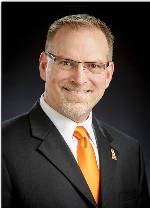
Kenneth Sewell graduated from Kansas State University with his Bachelors of Science in 1986. He is currently Vice President for Research at Oklahoma State University and serves as President of the OSU Research Foundation. Ken stated that his undergraduate psychology experience in systemic task analysis and decision-making, (research methods, problem solving and decision making) as well as developing people skills continue to help him in his work. Additionally he stated he gained a deep understanding of how life-changing undergraduate research can be for students, especially first-generation college students.
Thomas Clark
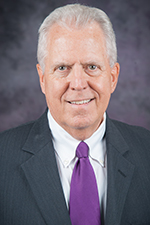
Thomas Clark graduated from Kansas State University with his Bachelors of Science in 1971. He is currently a part-time adjunct professor in the National Strategic Selling Institute at KSU. Tom is also a retired sales executive from the high technology industry having worked a variety of leadership roles in direct sales, channel sales, strategic alliance management and global business development for many Fortune 500 companies. He stated that his undergraduate psychology experience learning critical thinking skills, gaining understanding of different personality types, and how to effectively work with many different types of people was essential. Finally, he suggests undergraduate students take a business class if they think they may have an interest in that career path.
